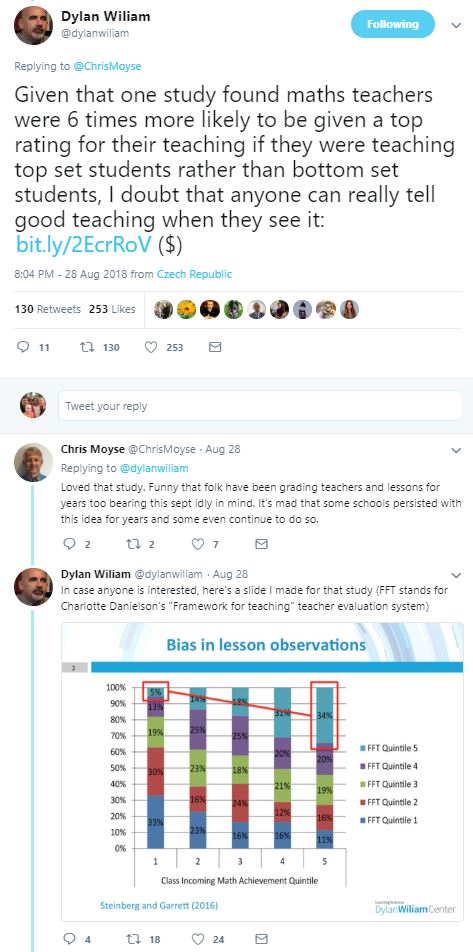Cards on the table. I am highly critical of triennial performance reviews, performance management, of any flavour that casts dark skies over many schools up and down the country. I have been banging my very little drum, as loudly as I possibly can, telling anyone who will listen that performance review and performance related pay (PRP) within education is critically and fundamentally flawed – and I have the cold, hard, evidence to back up these statements. At last I have a listening ear.
With the backing of the Education Support Partnership I was able to convene a conversation with the National Education Union, share my position, and start a louder conversation around the topic. I know I am not the only professional questioning the apparently unchallenged practice of performance review and PRP. You do feel infinitely better, assured, when someone you respect and look up to, commits a similar viewpoint.
I am in the process of writing a Professional Growth policy for my MAT with a view to replacing old performance management / appraisal.
No data targets and build on Teacher standards, personal growth and TRUST!
Anyone doing something similar – would love to hear from you
— Chris Moyse (@ChrisMoyse) September 11, 2018
Then this week, we had NAHT Accountability Commission’s new report. Even if we agree that accountability systems are designed to ensure schools perform, we hear this damning conclusion.
The approaches used by the government to hold schools to account are acting as a brake to overall improvement and are, on balance, doing more harm than good.
Under that accountability umbrella, like a small child sulking at the back of room, sits performance review. Across the room from PRP.
Schools leaders, I am so sorry, I know you have been working tirelessly to reset a culture of high aspiration and community in school, welcoming new students and reassuring anxious parents. I [more than] half expect you have been burning the midnight oil, searching for nuggets of excellence to congratulate and amplify, prioritising those areas of the school, and those staff, that need your support most, drafting examination reports to governors and trusts. You most probably took on the responsibility of handling the unexpected and unforeseen, so that the senior staff can focus on what matters most. I am so sorry, but I must implore you to think again about those performance management conversations that could undo all that investment, that can so easily do more harm than good. Despite our best intentions.
Starting with the Chartered Institute of Personnel and Development (CIPD) 2016 report Could do better (2016) Assessing what works in performance management and conversations with Rob Briner (Professor of Organizational Psychology in the School of Business and Management) and Matt O’Leary (Professor of Education at Birmingham City University) let me give you a reason to pause, reflect and respond. Again, I am so sorry, I know it will add to your immediate workload.
When change is required
Former CEO of Visa, Dee Hock, almost single handedly reimagined the banking world. He words ring in my thoughts when I reflect on the sad state of affairs teachers and teaching, have found themselves subjected to, in the name of raising standards.
Understanding requires mastery of four ways of looking at things – as they were, as they are, as they might become, and as they ought to be. – Dee Hock Birth of the Chaordic Age
How important is it for leaders, in any organisation, to be able to respond to this statement? Arguably, these four questions present a unifying framework for self-evaluation, appraisal and visioning.
“As they were?” – Reporting in 2012, the School Teachers’ Pay Review Body (STRB) judged that very high success rates at the “Threshold assessment” meant that progression had become practically automatic. It recommended a reinvigorated link between pay and performance for all classroom teachers in England and Wales (STRB, 2012), and greater flexibility for Threshold progression. Namely:
- Differentiated performance-based progression on the main pay scale to enable teachers to progress at different speeds, with higher rewards and more rapid progression for the most able teachers.
- More flexible performance-based progression to and within the upper pay scale, assessed against substantially simplified criteria, enabling abolition of the bureaucratic post threshold standards.
- Local discretion to pay a higher salary to the most successful teachers if a post (akin to the ‘Advanced Skills Teachers’) is required and meets simple yet demanding criteria on leading improvement of teaching skills.
(STRB 2012 Para 4.61)
It also proposes new more flexible criteria for progression from the Main to the Upper Pay Scale (to replace the former Threshold system)
- Substantial and sustained achievement of objectives, appropriate skills and competence in all elements of the Teachers’ Standards, and
- The potential and commitment to undertake professional duties which make a wider contribution (which involves working with adults) beyond their own classroom.
(STRB 2012 Para 4.72)
“As they are,” autumn of 2013, a new pay system was introduced for school teachers in England and Wales, linking future pay progression to performance. Henceforth annual pay progression would be based on a performance review against agreed objectives and teachers’ standards. For more senior teachers, on the Upper Pay Scale, this meant a reinvigoration of a link with performance that was judged to have declined since its introduction in 2000.
Of course, this is all wrapped up with performance review, and all the ills that entails.
CIPD – could do better
Common practice in performance management has remained broadly stable for two or three decades, but the last few years has seen a proliferation of popular articles challenging the received wisdom and a number of high profile businesses looking for different ways to engage, recognise, evaluate and develop their staff. The broad thrust is that traditional practices – in particular the dreaded annual appraisal – are outdated, if indeed they ever worked.
Let’s be very clear here. ‘Could do better.’ is a broad overview of performance management and we need to be mindful that education (as with any defined industry) will respond to performance management uniquely. Given the social importance of education, there is significant research to draw upon from the education itself and comparisons within the public sector.
Performance management is hardly convincing.
Senior leaders from outside HR were even more critical, 73% considering annual appraisals ineffective and nearly half 46% considering six monthly appraisals ineffective. Contrast that to that of their views on coaching or mentoring, which 92% of HR leaders and 79% of non-HR leaders saw as effective.
Criticisms of performance reviews: overly time consuming and energy sapping, disappointing and ultimately demotivating, divisive and not conducive to co-operation, not effective drivers of performance.
Goal setting
The report highlights the fragility of goal setting (the process by which aims / objectives / targets are often set.)
Goal setting is rather like prescriptive medication, in that it certainly works, but can be easy to misapply or get the wrong ‘dosage’. Generally powerful motivator, they can detract from what needs to be focused on in ‘complex task’ that involve navigating interrelated steps and stages.
Contextual factors such as job type should always be taken into account.
I am confident, few in teaching, would contest that teaching is ‘complex,’ and that regrettably, context is all too often not accounted for, as Dylan Wiliam alluded to so critically here.
Sticking with goal setting or whichever term applied (aims / objectives / targets), as intrinsically linked to appraisal, rests on monitoring progress and feedback. That being able to see the distance from the goal is crucial.
This confirms that performance management should be seen as a continuous chain of connected activities, not as a discrete process that is occasionally revisited.
And yet, as far as I can investigate, the process typically employs a triennial model. Why three meetings? Even if the closing and opening meetings are to often a befuddled mess.
Even then, systematically assessing employee performance requires managers to apply standardised measures or ratings. Unfortunately, there are a number of potential sources of bias in this, especially from the raters or managers themselves, and many of these may not be conscious. #Fail. Gender bias, managers that have been rated highly themselves, leads to their higher ratings, employees hired or recommended by the manager who is rating their performance, leads to higher ratings, introverted managers tend to underrate extroverted and/or disagreeable employees. Need we go on. #Fail.
Feedback
Feedback generally contributes to performance, but there is a great deal of variation: in many cases it has no effect or even worsens performance.
Performance Related Pay
The CIPD report clearly states
…a more fundamental question relates to the purpose of appraisal. Managers go about assessments in cognitively different ways, with different results, when they are used for administrative purposes (such as to inform pay decisions) than when they are used for developmental purposes. Therefore, we recommend that any single process or meeting focuses on one or the other of these, but not both. Introducing some clear water between assessments that inform pay and promotions and those that help employees improve should make performance management a far smoother, more productive and less fraught process.
As yet, I have not seen this important advice applied to performance review in education. Rather professional development and the administration of a pay award, is very much encouraged. Think again.
I also learnt that in an administrative context (eg pay and promotions for example) raters tend to highlight poor performance.
In a developmental context – raters tended to look at all aspects of employees’ work and performance, using positive and negative examples to reach their conclusions.
Could it get any more confusing for the reviewee?
Left field
Here is one idea I had not thought about. One course of action the CIPD would recommend to employers get to ‘appraise the appraisal’. It is not the processes per se that are important, so much as employees’ reactions to them, and these are particularly influenced by how fair and useful they experience performance appraisal to be. Have you ever asked your staff about their views of the school performance review process? I plan to.
Conclusion
Think again. I will leave you with these three statements…
Despite broad support for the principle of linking pay to performance, only a small percentage of employees thought their existing performance pay schemes provided them with an incentive to work beyond job requirements or to take more initiative. Marsden (2004)
For example, a number of studies highlight the existence of some form of ‘public service motivation’ among public sector employees, suggesting that they may derive much of their motivation from their belief in the intrinsic value of the service they perform, rather than its financial reward (Anderfuhreren-Biget et al., 2010; Ashraf et al., 2014; Leigh, 2013; OECD, 2009; Taylor and Taylor, 2011). There may even be a risk that performance pay can detract from, or ‘crowd out’, intrinsic motivation, thus subverting the intentions of a PRP scheme. (A review of the evidence on the impact, effectiveness and value for money of performance-related pay in the public sector).
Even the government’s favourite education ‘research’ organisation, the OECD, have found that PRP has a damaging effect in countries where teachers are already relatively well rewarded.
“As they might become, and as they ought to be?” We are not there yet. More investigation is needed.
Part 2 is now available.



